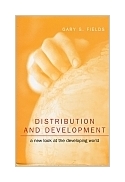|
||
• wydawnictwa polskie
• Zamów informacje o nowościach z wybranego tematu • kontakt
• Cookies na stronie |
DISTRIBUTION AND DEVELOPMENTFIELDS G.wydawnictwo: MIT PRESS , rok wydania 2001, wydanie Icena netto: DISTRIBUTION AND DEVELOPMENT Most of the world's people live in "developing" economies, as do most of the world's poor. The predominant means of economic development is economic growth. In this book, Gary Fields asks to what extent and in what circumstances economic growth improves the material standard of living of a country's people. Most development economists agree that economic growth raises the incomes of people in all parts of the income distribution and lowers the poverty rate. At the same time, some groups lose out because of changes accompanying economic growth. Fields examines these beliefs, asking what variables should be measured to determine whether progress is being made and what policies and circumstances cause some countries to do better than others. He also shows how the same data can be interpreted to reach different, even conflicting, conclusions. Using both theoretical and empirical approaches, Fields defines and examines inequality, poverty, income mobility, and economic well-being. Finally, he considers various policies for broad-based growth. Gary S. Fields is Professor of Labor Economics and Economics in the School of Industrial and Labor Relations at Cornell University. "This volume presents the results of decades of imaginative research by Fields on the most critical set of issues in development today. Distribution and Development goes beyond examining the relationship between growth and distribution to include the burgeoning concern with poverty alleviation, as well as such innovative topics as income mobility and economic well-being. An excellent text for advanced undergraduate and graduate students' "Fields's combination of simple examples, basic theory, and empirical evidence provides a clear, comprehensive, and current account of how inequality, poverty, and growth interact in the course of development. After reading this book, no one will question that 'economic growth is essential to improving the economic well-being of a nation's people.'" "This book provides a masterful review of issues that have recently burst back into prominence. The exposition of issues that are sometimes technical and often misunderstood is crystal clear. This together with the effective coupling of theoretical and empirical work will ensure a ready market in the research community and far beyond. The discussion of income mobility takes the reader right to the contemporary frontier in the inequality literature." "This book fills a gap in the development economics literature by providing a clear and complete statement of the evidence accumulated so far about the effects of development on income distribution and poverty, and by making easily accessible the analytical tools to deal with these issues. It will prove extremely useful to both newcomers to the field of development and specialists. In particular, the extension of the standard analysis to income mobility is methodologically innovative and a significant step forward." 256 pages
Po otrzymaniu zamówienia poinformujemy, |


